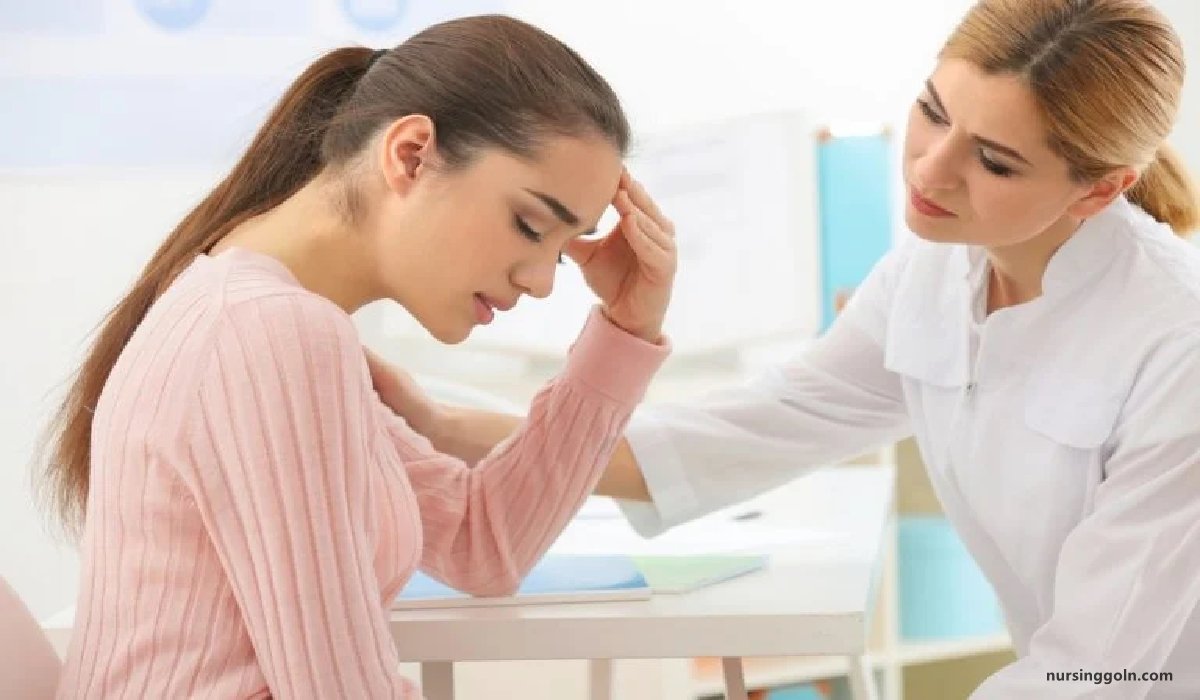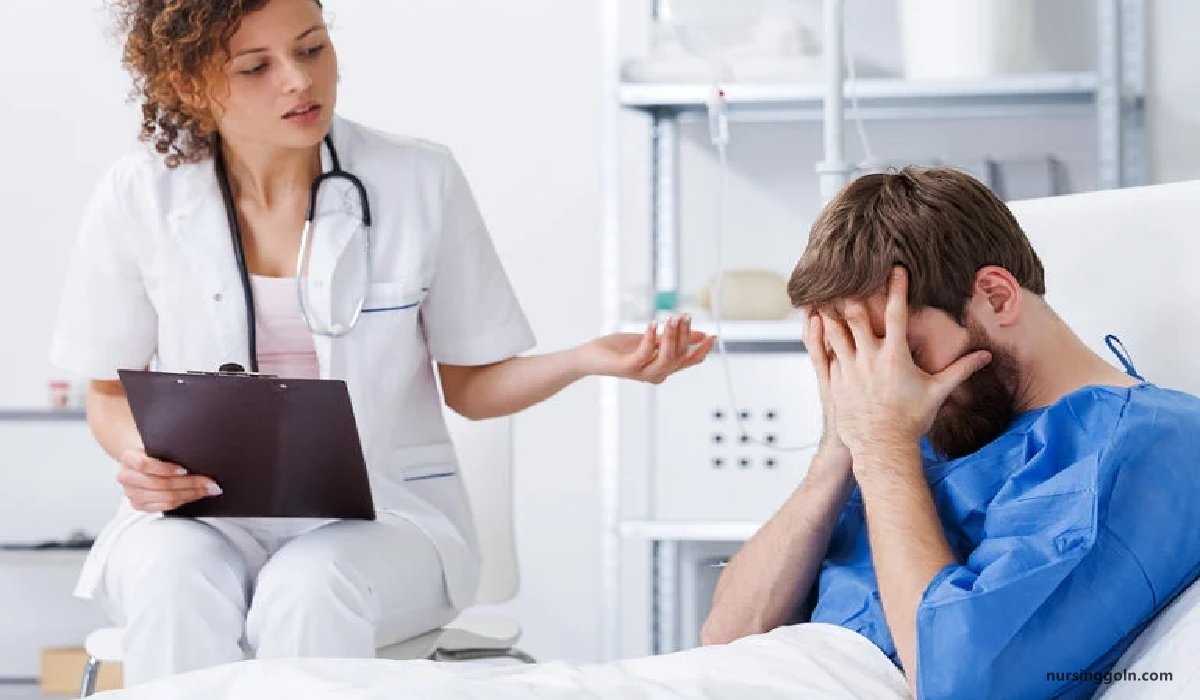Concept of Psychosis – This book covers the entire syllabus of “Psychiatric Nursing” prescribed by the Universities of Bangladesh- for Basic and diploma nursing students. We tried to accommodate the latest information and topics. This book is an examination-friendly setup according to the teachers’ lectures and examination questions.
At the end of the book previous university questions are given. We hope in touch with the book students’ knowledge will be upgraded and flourish. The unique way of presentation may make your reading of the book a pleasurable experience.

Concept of Psychosis
Broadly speaking, psychosis means a loss of contact with reality; it is a symptom of a number of mental illnesses rather than a medical condition in its own right. This page offers a full description of psychosis, what causes it, some examples of psychotic conditions, and how it is treated.
Fast facts on psychosis
Here are some key points about psychosis. More detail and supporting information is in the main article.
- Psychosis is not a disease in its own right; it is a symptom
- A common psychotic delusion is a belief that the individual is an important figure
- Earlier diagnosis of psychosis improves long-term outcomes
Psychosis is an umbrella term; it means that an individual has sensory experiences of things that not exist and/or beliefs with no basis in reality. During a psychotic episode, an individual may experience hallucinations and/or delusions. They may see or hear things that do not exist.
This can be incredibly frightening for the individual and, sometimes, the symptoms can cause them to lash out and hurt themselves or others. Psychosis is classically associated with schizophrenia spectrum disorders, and, although there are other symptoms, one of the defining criteria for schizophrenia is the presence of psychosis.
A number of disorders can display psychotic symptoms, including:
1. Schizophrenia – a serious mental health disorder affecting the way someone feels, thinks, and acts. Individuals find it difficult to distinguish between what is real and what is imaginary.
2. Schizoaffective disorder a condition similar to schizophrenia that includes periods of mood disturbances.
3. Brief psychotic disorder – psychotic symptoms last at least I day but no longer than 1 month. Often occurring in response to a stressful life event. Once symptoms have gone, they may never return.
4. Delusional disorder – the individual has a strong belief in something irrational and often bizarre with no factual basis. Symptoms last for 1 month or longer.
5. Bipolar psychosis – individuals have the symptoms of bipolar disorder (intense highs and lows in mood) and also experience episodes of psychosis. The psychosis more commonly occurs during manic phases.
6. Psychotic depression – also known as major depressive disorder with psychotic features.
7. Postpartum (also called postnatal) psychosis a severe form of postnatal depression.
8. Substance-induced psychosis including alcohol, certain illegal drugs, and some prescription drugs, including steroids and stimulants.
Causes of psychosis:
These are the primary causes of psychotic symptoms, but psychosis can also be secondary to other disorders and diseases, including:
- Brain tumor or cyst
- Dementia – Alzheimer’s disease, for example
- Neurological illness – such as Parkinson’s disease and Huntington’s disease
- HIV and other infections that can affect the brain
- Some types of epilepsy
- Stroke
- Causes of psychosis
- The exact causes of psychosis are not well understood but might involve:
- Genetics – research shows that schizophrenia and bipolar disorder may share a common genetic cause,
- Brain changes – alterations in brain structure and changes in certain chemicals are found in people who have psychosis. Brain scans have revealed reduced gray matter in the brains of some individuals who have a history of psychosis, which may explain effects on thought processing
- Hormones/sleep – postpartum psychosis occurs very soon after giving birth (normally within 2 weeks). The exact causes are not known, but some researchers believe it might be due to changes in hormone levels and disrupted sleep patterns.
- Symptoms of psychosis
Signs and symptoms of psychosis:
The classic signs and symptoms of psychosis are:
- Hallucinations – hearing, seeing, or feeling things that do not exist
- Delusions – false beliefs, especially based on fear or suspicion of things that are not real
- Disorganization in thought, speech, or behavior
- Disordered thinking – jumping between unrelated topics, making strange connections between thoughts
- Catatonia unresponsiveness
- Difficulty concentrating
Depending on the cause, psychosis can come on quickly or slowly. The same is the case in schizophrenia, although symptoms may have a slow onset and begin with milder psychosis, some people may experience a rapid transition back to psychosis if they stop taking their medication.
The milder, initial symptoms of psychosis might include:
- Feelings of suspicion
- General anxiety
- Distorted perceptions
- Depression
- Obsessive thinking
- Sleep problems
Diagnosis of psychosis:
In this section, we will discuss the available tests and methods for diagnosing psychosis.
Early diagnosis
Early diagnosis of psychosis improves long-term outcomes. This is not always achieved, however. The milder forms of psychosis that can lead to schizophrenia are left untreated for an average of 2 years, and even full psychosis can take a number of years before it receives the attention of medical professionals.
To increase the chances of early detection, guidance for healthcare systems drawn up by psychiatrists recommend that the “possibility of a psychotic disorder should be carefully considered” in a young person who is:
- Becoming more socially withdrawn
- Performing worse for a sustained period at school or work, oral
- Becoming more distressed or agitated yet unable to explain why,
There is no biological test for psychosis itself, and if laboratory tests are done, it is to rule out other medical problems that might provide an alternative explanation.

Questions for patient and family
Psychosis is primarily diagnosed by clinical examination and history the doctor examines the patient and asks about their symptoms, experiences, thoughts, and daily activities; they will also ask if there is a family history of psychiatric illness.
Other medical conditions are ruled out first of all, especially delirium (sudden onset of a confused state), but epilepsy and a number of other medical explanations are possible.
Doctors will also check for any history of intoxication with drugs, both legal and illegal, and toxins, usually asking for a urine sample to check this. 1
Once psychosis is narrowed down to a psychiatric cause, there are clearly defined criteria that must be met before a diagnosis is confirmed. Psychiatrists generally rely on the American Psychiatric Association
(APA)’s publication known as the DSM (Diagnostic and Statistical Manual of Mental Disorders) to make psychiatric diagnoses.
Brain scans
Brain scans may be done in the early stages of medical attention so that other conditions – often treatable and reversible can be ruled out.
EEG (electroencephalography) testing records the brain’s electrical activity and may help to rule out delirium, head injury, or epilepsy as possible causes of psychotic symptoms.
Treatments for psychosis:
Treatment for psychosis involves using a combination of:
◇ antipsychotic medication – which can help relieve the symptoms of psychosis
◇ psychological therapies the one-to-one talking therapy cognitive behavioral therapy (CBT) has proved successful in helping people with schizophrenia; in appropriate cases, family therapy has been shown to reduce the need for hospital treatment in people with psychosis
◇ social support support with social needs, such as education, employment, or accommodationMost people with psychosis who get better with medication need to continue taking it for at least a year. Some people need to take medication long term to prevent symptoms recurring. If a person’s psychoic episodes are severe, they may need to be admitted to a psychiatric hospital.
Complications of psychosis:
- Inability to keep a job
- Poor academic performance or dropping out of school
- Financial problems
- Homelessness
- Substance abuse and substance use disorders
- Legal problems or even incarceration
- Hospitalization
- Damaged or lost relationships
- Social isolation
- Violence, as a victim or perpetrator
- Co-occurring mental illnesses, like depression or anxiety disorders
- New or worsening medicul conditions
- Self-harm
- Suicide
Organic psychosis:
Organic psychosis are characterized by abnormal brain function that is caused by a known physical abnormality, which in most cases is: some organic disease of the brain.
Or,
Organic psychosis were believed to result from a a physical defect of or damage to the brain, Eunctional psychoses were believed to have no physical brain disease evident upon glinical examination. Much research suggests that this distinction between organic and functional is probably.
